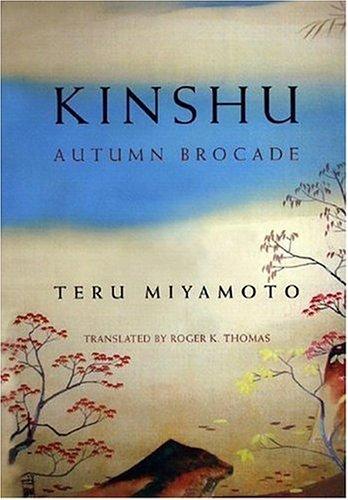Hardcover, 208 pages
English language
Published Feb. 25, 2007 by New Directions.

Hardcover, 208 pages
English language
Published Feb. 25, 2007 by New Directions.
Life, death, karma—these interwoven themes form the heart of this lyrical novel in letters, Kinshu: Autumn Brocade, the first work to be published in the U.S. by Teru Miyamoto, one of Japan's most popular literary writers.
The word kinshu has many connotations in Japanese—brocade, poetic writing, the brilliance of autumn leaves—and resonates here as a vibrant metaphor for the complex, intimate relationship between Aki and Yasuaki. Ten years after a dramatic divorce, they meet by chance at a mountain resort. Aki initiates a new correspondence, and letter by letter through the seasons, the secrets of the past unfold as they reflect on their present struggles. From a lover's suicide to a father's controlling demands, to Mozart's Thirty-Ninth Symphony ("a veritable marvel of sixteenth notes"), to the karmic consequences of their actions, the story glides through their deeply introspective and stirring exchanges. What begins as a series of accusations and …
Life, death, karma—these interwoven themes form the heart of this lyrical novel in letters, Kinshu: Autumn Brocade, the first work to be published in the U.S. by Teru Miyamoto, one of Japan's most popular literary writers.
The word kinshu has many connotations in Japanese—brocade, poetic writing, the brilliance of autumn leaves—and resonates here as a vibrant metaphor for the complex, intimate relationship between Aki and Yasuaki. Ten years after a dramatic divorce, they meet by chance at a mountain resort. Aki initiates a new correspondence, and letter by letter through the seasons, the secrets of the past unfold as they reflect on their present struggles. From a lover's suicide to a father's controlling demands, to Mozart's Thirty-Ninth Symphony ("a veritable marvel of sixteenth notes"), to the karmic consequences of their actions, the story glides through their deeply introspective and stirring exchanges. What begins as a series of accusations and apologies, questions and excuses, turns into a source of mutual support and healing. Chosen as an Outstanding Work of Japanese Literature by the Japanese Literature Publishing Project.